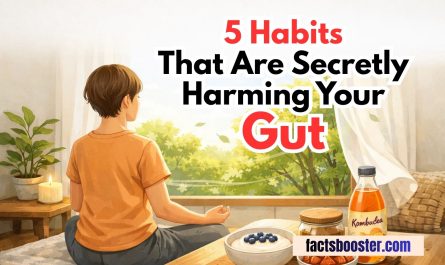Beating chronic fatigue through circadian rhythm reset and energy management habits that changed everything
The rain began at 4:00 a.m. I know because I was awake to hear it—that steady drumming on the roof that should have been soothing but somehow felt accusatory. I’d gone to bed early the night before, desperately hoping that more hours under the covers would finally break the cycle of being always tired no matter how much you sleep. But by the time I dragged myself out of bed, nothing had changed. Just that same bone-deep exhaustion, accompanied by a relentless gray drizzle that turned the world into a watercolor painting left out in the weather.
I stepped outside to check the mailbox, and within seconds, the mist clung to my skin. My leg started that familiar ache—the one that shows up when the air pressure drops and my body decides to remind me it’s been carrying too much for too long. I stood there, rainwater seeping into my shoes, staring at the low-hanging clouds. Everything felt heavy. The sky. The air. My limbs. Like the weather had crawled inside me and set up camp.
I went back inside, dripping on the tile, and thought: The sky wasn’t the only thing running on empty.

The Weight I Was Carrying
I’d been always tired for months. Not the kind of tired that makes you yawn through a meeting—the kind that makes you wonder if you’d somehow forgotten how to be awake. I was always tired no matter how much I slept the night before. I’d open my eyes in the morning and immediately feel like I’d already worked a full shift. My brain moved through sludge. Simple decisions took forever. I’d sit at my desk and realize I’d been staring at the same sentence for five minutes.
I told myself it was normal. Bad sleep. Work stress. Too much screen time. All the usual suspects. But the truth was I felt always tired no matter how much you sleep, and that reality scared me more than I wanted to admit. Something felt fundamentally misaligned, like my entire system was trying to run on outdated software.
I blamed my pillow. My mattress. My schedule. Everything except the actual truth I wasn’t ready to face: It wasn’t just exhaustion—it was disconnection.
Always Tired No Matter How Much You Sleep – The Real Cause of My Exhaustion
When I finally sat with it, really sat with it, the pattern became obvious. I was living at odds with every natural rhythm my body was designed to follow. Late nights scrolling through blue-lit screens. Breakfast at random times—or skipped entirely. Coffee at 10 a.m., 2 p.m., sometimes 7 p.m. I’d work through lunch, eat dinner at 9, then wonder why I couldn’t sleep.
This is why so many of us feel always tired no matter how much you sleep—we’re fighting against our own biology. I was living like a phone that never stopped charging—always plugged in, never truly recharged.
My body was trying to sync with the sun, the seasons, the quiet biological clock that’s been ticking since humans first learned to stand upright. But I was too busy overriding it with artificial light, stress hormones, and sheer stubborn willpower. Being always tired had become my default setting.
The lesson crept in slowly: energy isn’t created by rest alone. It’s created by rhythm. By reset. By actually listening when your body whispers instead of waiting for it to scream.
Relearning How to Recharge
So I started small. Almost embarrassingly small. No dramatic overhauls or militant routines—just gentle adjustments that felt more like remembering than learning.
I began letting morning light touch my eyes before I touched my phone. Just standing by the window for two minutes while the coffee brewed. It felt strange at first, almost pointless. But after a few days, I noticed my brain waking up differently—clearer, less resistant. The constant fog of being always tired started to thin.
I drank water before caffeine. Not because some wellness guru said to, but because my body seemed to respond to it like a houseplant finally getting watered.
After lunch, instead of pushing through the afternoon slump, I walked. Slowly. No destination. Just fifteen minutes of moving without a goal. It felt like giving my nervous system permission to exhale—a small rebellion against the always tired feeling that had defined my days.
And before bed, I dimmed the lights. No overhead brightness, just soft lamps that signaled to my brain that the day was ending, not continuing.
None of it felt miraculous. No sudden transformation or burst of energy. Just quiet recalibration—like tuning an instrument that had been slightly off-key for so long, I’d forgotten what harmony sounded like. I could sense my body slowly, carefully syncing with natural cycles again. Remembering what it already knew.
When Energy Started to Return
The shift happened around day four. I woke up and didn’t immediately resent being conscious. My eyes opened, and instead of that crushing weight, there was just… wakefulness. Real wakefulness. For the first time in months, I wasn’t always tired the moment my alarm went off. My body felt lighter, like someone had finally set down a backpack I’d been carrying for miles without realizing.
My mind was calmer too. Thoughts came in clear lines instead of tangled knots. I could focus without forcing it. The fog had lifted—not completely, but enough to see where I was going. The cycle of feeling always tired no matter how much you sleep was finally breaking.
Emotionally, I felt dry after the storm. You know that particular quality of light that breaks through clouds after days of rain? That clean, almost fragile brightness? That’s what it felt like inside. Like I’d finally stepped out of the downpour and was standing in a patch of unexpected sun.
This was the moment I’d been waiting for without knowing I was waiting—the quiet confirmation that my body hadn’t forgotten how to feel good. It just needed permission to remember.
What I Learned About Real Energy
Here’s what nobody tells you about exhaustion: you can’t brute-force your way out of it. You can’t hack it with supplements or shame yourself into feeling better. If you’re always tired, it’s not a character flaw—it’s a signal. Energy doesn’t work like willpower. It works like weather patterns, tides, seasons.
Energy is rhythm plus awareness plus gentle discipline. It’s about syncing with your body’s natural cadence instead of constantly fighting against it. You can’t rush it or fake it. You have to align with it—the way you’d align with a dance partner instead of trying to drag them across the floor.
The micro-habits I’d adopted weren’t magic bullets. They were breadcrumbs leading me back to something I’d forgotten: that rest isn’t something we earn after we’ve proven ourselves worthy. Rest isn’t something we earn—it’s something we remember how to do.
We’re animals. Biological beings with circadian rhythms and nervous systems that respond to light, movement, nourishment, and quiet. When we honor that, energy returns—not as a reward, but as a natural consequence. The experience of being always tired no matter how much you sleep begins to fade when you work with your body instead of against it.
Start Your Own Energy Reset
If you’re reading this and recognizing yourself in the exhaustion, the fog, the sense that you’re always tired and running on empty—you don’t need a complete life overhaul. You just need to start. One mindful act today. One moment where you choose alignment over override.
Maybe it’s letting sunlight hit your face before your phone screen does. Maybe it’s a five-minute walk after lunch. Maybe it’s drinking water like you actually care about the body you’re living in.
If you’d like to rebuild your rhythm too, my 7-Day Energy Reset is a gentle guide to help you begin—no militant routines, no perfection required. Just small, intentional shifts designed to help your body remember what it already knows. Especially if you’ve been always tired for longer than you care to admit, this reset offers a pathway back to natural energy.
Because here’s the truth I learned standing in that rain, exhausted and disconnected: even when the rain doesn’t stop, you can still find sunlight within your own rhythm.

References
- Rippe JM. “Lifestyle Medicine: The Health Promoting Power of Daily Habits.” PMC. 2018. Available at: https://www.ncbi.nlm.nih.gov/pmc/articles/PMC6367881/
- Shen B., et al. “Effects of exercise on circadian rhythms in humans.” PMC. 2024. Available at: https://pmc.ncbi.nlm.nih.gov/articles/PMC10598774/
- Shaw E., et al. “The Impact of Time of Day on Energy Expenditure.” PubMed / MDPI Nutrients. 2019. Available at: https://www.mdpi.com/2072-6643/11/10/2383


